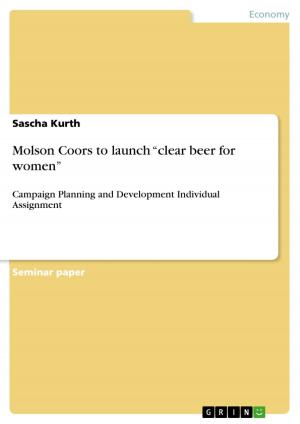Causes and effects of the violent outbreaks in Ireland and lower Canada
Nonfiction, History, Americas, Canada| Author: | Julia Geigenberger | ISBN: | 9783638023016 |
| Publisher: | GRIN Publishing | Publication: | March 19, 2008 |
| Imprint: | GRIN Publishing | Language: | English |
| Author: | Julia Geigenberger |
| ISBN: | 9783638023016 |
| Publisher: | GRIN Publishing |
| Publication: | March 19, 2008 |
| Imprint: | GRIN Publishing |
| Language: | English |
Essay from the year 2007 in the subject Cultural Studies - Canada, grade: A (87,5%), Bishop's University Lennoxville (Canada Québec: Bishop's University Lennoxville), 10 entries in the bibliography, language: English, abstract: Political and social conflicts culminate in rebellions when institutions do not succeed in resolving these conflicts. According to Jean-Paul Bernard, [w]e speak of rebellion when, above and beyond the daily administration of government affairs, the institutions themselves are challenged; when one side considers revolt and the other repression; and when neither side excludes the possibility of armed confrontation. British colonial rule did not succeed in resolving the political and social conflicts in Ireland in 1798 and Lower Canada in 1837-38, which led to violent rebellions. Nonetheless, the question arises, why do people resort to using a violent solution to conflicts? To analyze the violent outbreaks of the rebellions in Ireland and Lower Canada, a comparison can be made to the sequence of events in an explosion and fire. A spark only causes an explosion if an explosive mixture already exists. Explosive elements were present in both Ireland and Lower Canada. There are remarkable parallels between the Rebellion of 1798 in Ireland and the Rebellion of 1837-38 in Lower Canada. In particular there are political and socio-cultural factors of these rebellions which led to the violent outbreaks and also created, in turn, nationalism in the populations. The causes of the violent outbreaks are interwoven. This essay will demonstrate how political and socio-cultural factors of British rule in Ireland and Lower Canada caused dissatisfaction in both societies. Political, economic, social, religious, and cultural frustration divided the people. Due to that growing discontent, the Irish in 1798 and the people of Lower Canada in 1837-38 were willing to find common ground in a mass mobilization leading to a violent rebellion. The essay not only focuses on the causes of the violent outbreaks, but also shows their effect, namely the creation of nationalism in Ireland and Lower Canada.
Essay from the year 2007 in the subject Cultural Studies - Canada, grade: A (87,5%), Bishop's University Lennoxville (Canada Québec: Bishop's University Lennoxville), 10 entries in the bibliography, language: English, abstract: Political and social conflicts culminate in rebellions when institutions do not succeed in resolving these conflicts. According to Jean-Paul Bernard, [w]e speak of rebellion when, above and beyond the daily administration of government affairs, the institutions themselves are challenged; when one side considers revolt and the other repression; and when neither side excludes the possibility of armed confrontation. British colonial rule did not succeed in resolving the political and social conflicts in Ireland in 1798 and Lower Canada in 1837-38, which led to violent rebellions. Nonetheless, the question arises, why do people resort to using a violent solution to conflicts? To analyze the violent outbreaks of the rebellions in Ireland and Lower Canada, a comparison can be made to the sequence of events in an explosion and fire. A spark only causes an explosion if an explosive mixture already exists. Explosive elements were present in both Ireland and Lower Canada. There are remarkable parallels between the Rebellion of 1798 in Ireland and the Rebellion of 1837-38 in Lower Canada. In particular there are political and socio-cultural factors of these rebellions which led to the violent outbreaks and also created, in turn, nationalism in the populations. The causes of the violent outbreaks are interwoven. This essay will demonstrate how political and socio-cultural factors of British rule in Ireland and Lower Canada caused dissatisfaction in both societies. Political, economic, social, religious, and cultural frustration divided the people. Due to that growing discontent, the Irish in 1798 and the people of Lower Canada in 1837-38 were willing to find common ground in a mass mobilization leading to a violent rebellion. The essay not only focuses on the causes of the violent outbreaks, but also shows their effect, namely the creation of nationalism in Ireland and Lower Canada.















